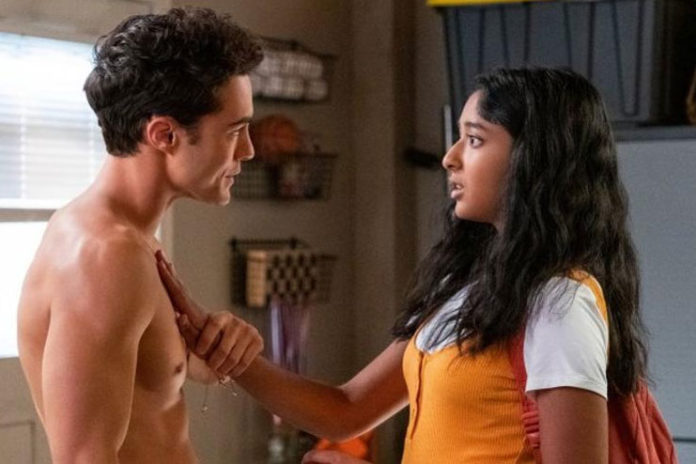Netflix is filled with “coming of age” shows depicting high school life and the cliche mean girls pragmatic. But, as imperfect as Never Have I Ever is, the show is a must watch for every Desi NRI who has struggled accepting their Indian-ness and their constant strive for being a modern American.
Mindy Kaling, who has herself struggled accepting her ethnic backgrounds has spilled her heart out into creating a show that has won the attention of the masses. The show packs in the message of the real life struggles blanketed in the safety of humor.
The protagonist of the show, Devi is a 15-year old, who just lost her father because of a heart attack. She is a high school sophomore in Sherman Oaks, California and fights the ritualistic struggles of being American but also staying in tandem with her Indian roots.
The story and character of Devi is real and something every migrant Indian faces when thrashed into the modern subjective of an American lifestyle. She is dreamy, brilliant with her academics, chaotic at times and indecisive, for the most parts.
The reason why this show has experienced a highlighted growth is because of the realistic touch it imprints. Devi is as normal as it comes. She is not extraordinary, nor is her life. It is the basic-ness of the character and the plot that makes you correlate with it better.
If you have watched Riverdale, which packs in a good chunk of millennial relativism in this age of pop culture, you will realise how orchestrated things are. Comparing this to Never Have I Ever, you will have a show that you can relate with.
The characters in the show narrate their story of their non-white identities. And, you wouldn’t have to stare hard to find them because they will be right in front of you. For example, there is a scene where Devi is doing a tiktok with her friends wearing a strappy red dress.
While it might not impact the American viewership, you will soon find the Desi Indian mom entering to take her daughter away to wear something decent. And, out she comes, wearing a white t-shit underneath her red strappy dress. This is the realism thrust into the life of every migrant Indian kid.
But, much like every show, you will find some cliche and unwanted phases that are nothing but straight stereotypes and could have been done without. The section where you learn about the story of Devi’s cousin, Kamala, is one of them.
Nalini, Devi’s mother, does root some of her characteristic from her Indian origin but for the most part, she undoes the stereotypes that every brown parent is slapped with. She is practical but rooted and is vulnerable but strong enough to live independently in a developed nation like US all along, raising her daughter all by herself. Poorna Jagannathan’s character is a statement piece.
Along the lines of struggles and the dualities of identities that Devi experiences, Kaling has managed to include in some of her statement humor pieces. While some do relate with such comments, they do pack in the cliche statement all the more.
Viewers often found this off putting and to be honest, it is. The show could have done well without those statements and snaggy humor comments.
But, then again, the moment that you start the show, you are attacked with the realism of a struggling NRI teen, trying to keep herself rooted to her ethnicity but also failing to not fall prey to the modernism of the foreign country she is in. You will love seeing Devi getting fed up with her culture at times but then coming around and praying to Lord Ganesha to make this right for her.
These subtleties of the show is what makes it a heart pragmatic tribute to every migrant Indian teen who has been struggling to strike a balance between her desi Indian roots and the modern day American “vibes”.














































